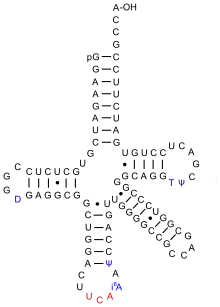N6-Isopentenyladenosin
N6-Isopentenyladenosin (i6A, Riboprin) ist ein seltenes Nukleosid und kommt in der tRNA vor.[4] Es besteht aus der β-D-Ribofuranose (Zucker) und dem N6-Isopentenyladenin. Es unterscheidet sich vom Adenosin durch Hinzufügen einer Isopentenylgruppe an der Aminogruppe. Das Adenosin wird mit Isopentenylpyrophosphat mittels der tRNA-Isopentenyltransferase zum N6-Isopentenyladenosin umgesetzt.[5][6] Es findet sich – wie N6-Threonylcarbamoyladenosin – neben dem Anticodon an Position 37 in tRNA sowohl in Bakterien als auch Eukaryoten.[7]
| Strukturformel | ||||||||||||||||||||||
|---|---|---|---|---|---|---|---|---|---|---|---|---|---|---|---|---|---|---|---|---|---|---|
 | ||||||||||||||||||||||
| Allgemeines | ||||||||||||||||||||||
| Name | N6-Isopentenyladenosin | |||||||||||||||||||||
| Andere Namen |
| |||||||||||||||||||||
| Summenformel | C15H21N5O4 | |||||||||||||||||||||
| Kurzbeschreibung |
weißer bis gelblicher Feststoff[1] | |||||||||||||||||||||
| Externe Identifikatoren/Datenbanken | ||||||||||||||||||||||
| ||||||||||||||||||||||
| Eigenschaften | ||||||||||||||||||||||
| Molare Masse | 335,36 g·mol−1 | |||||||||||||||||||||
| Aggregatzustand |
fest[1] | |||||||||||||||||||||
| Schmelzpunkt | ||||||||||||||||||||||
| Sicherheitshinweise | ||||||||||||||||||||||
| ||||||||||||||||||||||
| Soweit möglich und gebräuchlich, werden SI-Einheiten verwendet. Wenn nicht anders vermerkt, gelten die angegebenen Daten bei Standardbedingungen. | ||||||||||||||||||||||
Literatur
- Michel Laloue, Claude Terrine, Jean Guern: „Cytokinins: Metabolism and Biological Activity of N6-(Δ2-Isopentenyl)adenosine and N6-(Δ2-Isopentenyl)adenine in Tobacco Cells and Callus“, Plant Physiol., 1977, 59, S. 478–483 (Volltext).
- Maurizio Bifulco, Anna Maria Malfitano, Maria Chiara Proto, Antonietta Santoro, Maria Gabriella Caruso, Chiara Laezza: „Biological and Pharmacological Roles of N6-Isopentenyladenosine: An Emerging Anticancer Drug“, Anti-Cancer Agents in Medicinal Chemistry, 2008, 8 (2), S. 200–204 (PMID 18288922, doi:10.2174/187152008783497028).
Einzelnachweise
- Eintrag zu N6-Isopentenyladenosine bei Toronto Research Chemicals, abgerufen am 19. Januar 2022 (PDF).
- J. Elks: The Dictionary of Drugs: Chemical Data: Chemical Data, Structures and Bibliographies. Springer, 2014, ISBN 978-1-4757-2085-3, S. 797 (books.google.com).
- Dieser Stoff wurde in Bezug auf seine Gefährlichkeit entweder noch nicht eingestuft oder eine verlässliche und zitierfähige Quelle hierzu wurde noch nicht gefunden.
- Patrick A. Limbach, Pamela F. Crain, James A. McCloskey: „Summary: the modified nucleosides of RNA“, Nucleic Acids Research, 1994, 22 (12), S. 2183–2196 (doi:10.1093/nar/22.12.2183, PMC 523672 (freier Volltext), PMID 7518580).
- Larry K. Kline, Fritz Fittler, Ross H. Hall: „N6-(Δ2-Isopentenyl)adenosine. Biosynthesis in Transfer Ribonucleic Acid in Vitro“, Biochemistry, 1969, 8 (11), S. 4361–4371 (PMID 4311031; doi:10.1021/bi00839a021).
- Nadja Rosenbaum, Malcolm L. Gefter: „Δ2-Isopentenylpyrophosphate: Transfer Ribonucleic Acid Δ2-Isopentenyltransferase from Escherichia coli. Purification and Properties of the Enzyme“, J. Biol. Chem., 1972, 247 (18), S. 5675–5680 (PMID 4341485; Abstract; PDF).
- B. C. Persson, B. Esberg, O. Olafsson, G. R. Björk: „Synthesis and function of isopentenyl adenosine derivatives in tRNA“, Biochimie, 1994, 76 (12), S. 1152–1160 (PMID 7748950, doi:10.1016/0300-9084(94)90044-2).
Weblinks
- Modification Summary von N6-Isopentenyladenosine in der Modomics-Datenbank, abgerufen am 13. Januar 2014.
This article is issued from Wikipedia. The text is licensed under Creative Commons - Attribution - Sharealike. The authors of the article are listed here. Additional terms may apply for the media files, click on images to show image meta data.
